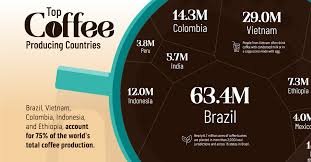Exploring the Top 10 Coffee Producing Countries in the World
Coffee, the beloved beverage cherished by millions worldwide, originates from a select group of countries renowned for their production prowess. As aspirants gearing up for various government exams, understanding the landscape of global coffee production can offer insights into economic dynamics, agricultural practices, and international trade patterns. Let’s delve into the top 10 coffee-producing nations and unravel the significance behind their caffeinated contributions.

Why this News is Important
Coffee’s Economic Impact: The global coffee industry is a vital economic driver for many nations, significantly impacting their GDP and employment rates. Understanding the leading coffee-producing countries sheds light on the economic significance of this commodity in both domestic and international markets.
Agricultural Diplomacy: Coffee production often intersects with diplomatic relations and trade negotiations between nations. Knowledge of the top coffee producers equips aspirants with insights into the diplomatic dynamics underlying agricultural trade agreements and international cooperation.
Consumer Trends and Preferences: Consumer preferences for coffee varieties often dictate market demand and influence global trade patterns. Familiarizing oneself with the leading coffee-producing countries aids in anticipating market trends and understanding consumer behavior, which is crucial for policymakers and business strategists alike.
Environmental Concerns: Coffee cultivation practices impact local ecosystems and environmental sustainability. Being aware of the key players in coffee production enables stakeholders to assess the environmental implications of agricultural activities and advocate for sustainable practices.
Market Opportunities: For aspirants eyeing careers in international trade, agriculture, or economic policy, knowledge of the top coffee-producing countries unveils potential market opportunities and avenues for economic development. Understanding the nuances of coffee production can inform strategic decisions in various professional domains.
Historical Context
Coffee cultivation traces its roots back centuries, with origins in regions such as Ethiopia and Yemen. The spread of coffee cultivation across continents catalyzed social, cultural, and economic transformations, shaping global trade networks and societal rituals.
In the 17th century, coffeehouses emerged as vibrant hubs of intellectual exchange and social discourse in cities like London and Paris, contributing to the Enlightenment movement and the proliferation of coffee culture across Europe.
Colonial powers played a pivotal role in expanding coffee cultivation to regions like Latin America, Southeast Asia, and Africa, leveraging labor systems such as slavery and indentured servitude. This historical backdrop illuminates the complex dynamics of power, exploitation, and cultural exchange intertwined with coffee production.
Key Takeaways from “Top 10 Coffee Producing Countries in the World”
| Serial Number | Key Takeaway |
|---|---|
| 1. | Brazil is the leading coffee-producing country globally. |
| 2. | Vietnam holds the second position, known for robusta coffee production. |
| 3. | Colombia ranks third and is renowned for its high-quality arabica beans. |
| 4. | Indonesia is a key player in the global coffee market, particularly in robusta production. |
| 5. | Ethiopia, the birthplace of coffee, maintains its significance as a major producer. |
Important FAQs for Students from this News
Question: How does coffee production contribute to the economy of coffee-producing countries?
Answer: Coffee production significantly impacts the GDP and employment rates of coffee-producing nations, driving economic growth and providing livelihoods for millions.
Question: What are the key factors influencing consumer preferences in the global coffee market?
Answer: Consumer preferences in the coffee market are influenced by factors such as taste preferences, cultural norms, pricing, and sustainability concerns.
Question: Why is it important for policymakers to understand the dynamics of coffee production?
Answer: Policymakers need to grasp the nuances of coffee production to make informed decisions regarding international trade agreements, agricultural policies, and environmental sustainability measures.
Question: How has the historical context of coffee cultivation shaped its global significance?
Answer: The historical spread of coffee cultivation has influenced societal rituals, economic systems, and cultural exchanges, contributing to its enduring global significance.
Question: What role do environmental concerns play in coffee production?
Answer: Environmental concerns in coffee production encompass issues such as deforestation, pesticide use, and water consumption, highlighting the importance of sustainable farming practices.
Some Important Current Affairs Links

















